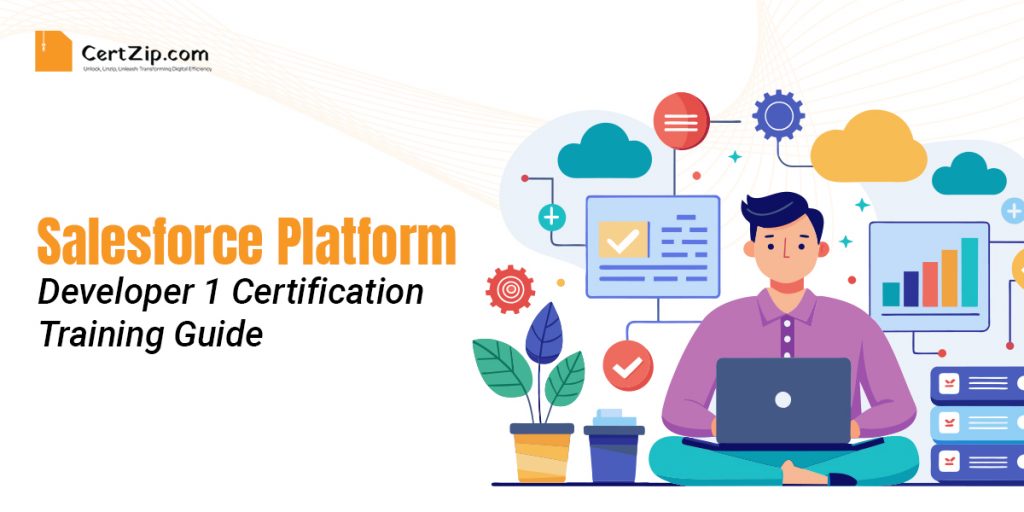Salesforce has become a cornerstone in the world of Customer Relationship Management (CRM), offering a vast array of tools and services to help businesses manage their customer interactions and data. Moreover, among its many certifications, the Salesforce Platform Developer 1 (PD1) certification and Salesforce Platform Developer 1 training are designed for developers who have knowledge, skills, and experience in building custom applications on the Lightning Platform.
Let’s talk about the major key points:
Moreover, the goal of this tutorial is to give a thorough overview of the education required to earn the Salesforce Platform Developer 1 certification.
Understanding the salesforce platform developer 1 certification-
Who Should Take This Certification?
The Salesforce Platform Developer 1 certification is ideal for:
- Developers with experience in building and deploying business logic and custom user interfaces using the programmatic capabilities of the Lightning Platform.
- Those looking to validate their skills and enhance their career prospects in the Salesforce ecosystem.
- Individuals seeking to transition from other development platforms to Salesforce.
Prerequisites
Before attempting the PD1 certification, it’s beneficial to have:
- A basic understanding of Salesforce fundamentals.
- Experience with object-oriented programming languages (such as Java, C#, or Python).
- Familiarity with JavaScript and web development.
Key Areas of Study-
The PD1 certification exam covers several key areas:
Salesforce Fundamentals
Understanding the Salesforce architecture
Knowing different Salesforce environments and their use cases
Familiarity with the Salesforce data model
Data Modeling and Management
Creating and modifying objects, fields, and relationships
Data import and export tools
Understanding schema builder
Process Automation and Logic
Using declarative automation tools like Process Builder and Workflow Rules
Writing Apex triggers and classes
Understanding governor limits and best practices for scalable code
User Interface
Building custom user interfaces using Visualforce
Moreover, developing Lightning components and applications
Using Salesforce Lightning Design System (SLDS)
Testing, Debugging, and Deployment
Writing test classes and understanding code coverage requirements
Debugging using debug logs and the Developer Console
Deployment strategies and tools (Change Sets, ANT Migration Tool, Salesforce DX)
APIs and Integration
Understanding REST and SOAP APIs
Integrating Salesforce with external systems
Using platform events and Change Data Capture for real-time integration
Recommended Study Resources-
Official Salesforce Resources
- Salesforce Trailhead: A free, interactive learning platform with modules, projects, and trails specifically designed for the PD1 certification.
- Salesforce Developer Documentation: Moreover, comprehensive documentation covering all aspects of Salesforce development.
Books
- “Salesforce Platform Developer I Certification Guide“ by Jan Vandevelde and Gaurav Kheterpal
- “Mastering Apex Programming” by Paul Battisson
Online Courses and Tutorials
- Pluralsight: Offers in-depth courses covering the exam topics.
- Udemy: Moreover, various courses on Salesforce development, including specific PD1 preparation courses.
Study Plan-
Creating a structured study plan is essential for success. Here’s a suggested approach:
- Foundation (Weeks 1-2):
- Review Salesforce fundamentals and data modeling.
- Complete introductory Trailhead modules.
- Intermediate Concepts (Weeks 3-5):
- Focus on process automation, Apex programming, and Visualforce.
- Engage with hands-on projects on Trailhead.
- Advanced Topics (Weeks 6-8):
- Dive into Lightning components, integration, and deployment strategies.
- Practice writing test classes and using debugging tools.
- Practice Exams and Review (Weeks 9-10):
- Take practice exams to identify weak areas.
- Moreover, review all topics, focusing on areas needing improvement.
- Therefore join study groups or forums to discuss challenging concepts.
Exam Tips-
Understand the Exam Format: The exam consists of 60 multiple-choice questions, and you have 105 minutes to complete it. Therefore the passing score is 65%.
Hands-On Practice: Moreover, ensure you have practical experience with the Salesforce platform. Theoretical knowledge alone isn’t enough. Hence if you’re looking for a starting point, “Salesforce for Beginners” resources can provide a foundational understanding.
Use the Salesforce Developer Community: Therefore engage with other developers to share knowledge and solve problems.
Stay Updated: Salesforce frequently updates its platform. Hence stay informed about new features and changes.
Conclusion:
Achieving the Salesforce Platform Developer 1 certification is a significant milestone for any developer looking to excel in the Salesforce ecosystem. Moreover, with a structured study plan, the right resources, and hands-on practice, you can confidently prepare for and pass the Salesforce Developer 1 certification examand CRM. Therefore this guide provides a roadmap to help you navigate the preparation journey, ensuring you have a solid understanding of the concepts and skills required to succeed.


